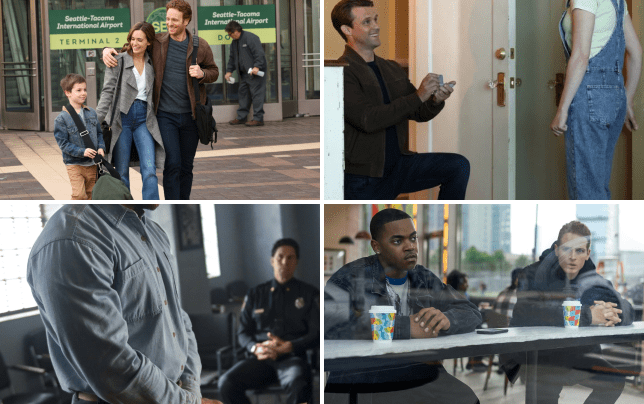How Monk Paved the Way for Neurodiverse Characters on TV
 Jack Ori
at
.
Jack Ori
at
.
On the surface, Monk wasn't much different from other gimmicky amateur sleuth series -- the genre that began with Murder She Wrote in the 1980s continued.
While Jessica Fletcher was an author-turned-sleuth and Diagnosis Murder's Mark Sloane was a doctor-turned-detective, Monk's selling point was that his OCD both hindered him and helped him to solve cases.
But for neurodiverse viewers like me, Monk was groundbreaking. While the series ended shortly before Parenthood became known for including an autistic character, Monk deserves the credit for having the first neurodiverse hero on TV.
Monk's OCD wasn't just a gimmick but part and parcel of who he was.
Although sometimes some of his quirks were played for laughs, he was a lot more than the butt of the joke. Lieutenant Stotlemeyer respected his opinion and knew his different perspective on cases was an asset to the police, even if Monk did drive him up the wall half the time.
His OCD allowed him to notice details others might miss; something slightly out of place raised red flags for him even though others didn't notice.
As an autistic person, I can relate to that. (I once was disturbed by the noise of a fan blowing in the background of a video, while my neurotypical therapist didn't even hear it!)
For the first time, there was someone like me on screen, someone who was brilliant at his job but lost when it came to social skills, had anxieties that didn't make sense to other people, and could be totally thrown off by changes in his routine or dashed expectations.
There was one episode where he devoted significant time to checking his canned goods for dents and throwing out any imperfections to protect himself against botulism -- something that I often do, too.
That wasn't a quirky or strange moment; it was the first time I'd ever encountered someone who did that on TV, and it felt great.
Of course, the Magic Neurodiverse Person can become a tired trope in the wrong hands.
If miswritten, stories about neurodiversity being a superpower can reinforce the idea that neurodiverse people aren't as human as neurotypical people or that every neurodiverse person has powers neurotypical people don't.
But Monk never veered into that territory. Monk's ability to see details others didn't made sense given his OCD, but that wasn't all there was to his character.
He had strong points and weak points like anyone else.
He could be annoying, and he sometimes fell into the trap of using his diagnosis as an excuse for poor behavior. (That was part of why Sharona was so good for him. She called him out on it when he was unfocused, rude, or obsessed with something irrelevant.)
In short, he was human and relatable, and that's why so many of his struggles have stuck in my mind over a decade after the series finale. One of my favorite episodes was Monk Season 2 Episode 4, Mr. Monk Goes to the Circus, because of a subplot involving Monk's difficulty understanding Sharona's perspective.
During this episode, Monk gets upset when Sharona won't accompany him to a circus tent where an elephant is housed to investigate the week's mystery.
Sharona is deathly afraid of elephants, and Monk has no sympathy. Nor does he understand why Sharona is upset when he tells her to "suck it up" for the sake of the case.
The problem might have seemed obvious to neurotypical people but not to Monk. He didn't know how to solve it, either, offering Sharona empty, non-genuine apologies because he knew he had hurt her but didn't understand how or why.
From his perspective, it was her job to help him be able to do his, so how dare she let a phobia get in her way -- even though she provided empathy and understanding when he was afraid of something everyone else thought was ridiculous.
There was so much crossover between issues like these and that I had as an autistic person that sometimes I wondered if Monk had been misdiagnosed!
And even more importantly, Monk was the title character. When there were subplots involving his difficulty relating, the focus was on him trying to solve the problem. It wasn't about how his behavior was problematic for other people, even if the people around him were getting annoyed.
That's important. For one thing, neurodiverse people have wants and needs like anyone else, and they have the ability to solve their own problems (even if they need help sometimes).
For another, it avoided the trap Parenthood often fell into of reinforcing the idea that neurodiversity is tragic and causes problems for neurotypical people.
The series generally treated Monk's mental health issues with the respect they deserved despite the show being lighthearted, cozy mystery fare.
Many shows that followed might not have existed or been written in the same way if Monk hadn't come first.
Bones is probably the closest thing to a Monk redux. Brennan was never officially diagnosed with anything; however, many neurodiverse fans agree she was a great example of an autistic character.
And while it isn't the same genre, The Good Doctor features a similar neurodiverse character who has his struggles and moments of brilliance. (If the spinoff, The Good Lawyer, gets the green light, we'll again have a lead character with OCD!)
One thing Monk never directly addressed was that he likely had PTSD as well, stemming from the loss of his wife.
By all accounts, Monk's OCD went entirely out of control after Trudy's death, rendering him unable to function.
He almost commits murder himself when he learns that one of the people involved in her killing is on life support at the hospital, and by the end of the series, he isn't sure what his purpose is once he's discovered the truth about her death.
This aspect of Monk's issues was never labeled anything other than a problem that made his OCD worse, but it's evident in retrospect that he probably had some PTSD, too. It'll be interesting to find out if the new movie addresses that.
Despite that, Monk did a lot not only to spotlight a neurodiverse character but also to normalize therapy. Monk went faithfully every week, and his sessions were as important a part of the hour as everything he did to solve the mystery.
Your turn, Monk fanatics!
If you are neurodiverse or know someone who is, how did this series affect you?
We want to hear your thoughts!
Hit the big, blue SHOW COMMENTS button and let us know.
We will review Mr. Monk's Last Case when it drops on December 8, 2023.
Jack Ori is a senior staff writer for TV Fanatic. His debut young adult novel, Reinventing Hannah, is available on Amazon. Follow him on X.














